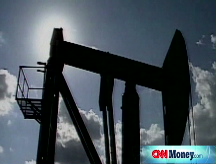Oil closes above $121 - up nearly $6
Crude futures rally as dollar weakens, fears of credit turbulence send investors back to commodities and concern over global supply mounts.

NEW YORK (CNNMoney.com) -- Oil surged more than $6 on Thursday to touch $122 a barrel, on a falling dollar and rising concerns about global supply.
U.S. crude for October delivery ended $5.62 higher at $121.18 a barrel, having reached as high as $122.04. Thursday's settlement price was the highest close since Aug. 4, when crude closed at $121.41.
The $5.62 jump in the price of crude was the largest single day advance since since June 6, when oil rose $10.75 in a single session. Thursday's jump was also the second largest one-day gain in dollar terms since oil has been traded, just behind the advance on June 6.
Wednesday's $114.98 settlement price ended active trading for the September contract.
Weaker dollar: Oil prices were supported by the falling dollar. The dollar was down against the euro and the yen on Thursday.
"You have the dollar down over 1% today and that is a pretty meaningful move for the dollar," said Brian Hicks, co-manager of the Global Resources Fund at U.S. Global Investors.
When the dollar weakens, investors like commodities as a hedge against inflation.
Investors were "running back to gold, running back to oil, so it seems we are seeing some of the running-back-to-safe haven" behavior, said Phil Flynn, senior market analyst at Alaron Trading.
The value of the dollar is falling because of the weak U.S. economy, which has been dragged down by the struggling financial sector.
With Fannie Mae (FNM, Fortune 500) and Freddie Mac (FRE, Fortune 500) stocks near historic lows and rumors of a federal bailout making Wall Street jittery, investors are more likely to keep their money safe in the steady commodity market, said Neal Dingmann, director of equity research at Dahlman Rose.
"The risk factors are back on the rise with the latest fears about Fannie Mae and Freddie Mac and that seems to have captured the imagination of the market," said Flynn.
Crude oil is traded in U.S. currency around the globe and so when the dollar weakens, crude oil becomes cheaper for foreign investors. "If the dollar does fall off, a lot of these guys [foreign investors] are able to consume more and buy more on a pure dollar-per-dollar basis," said Dingmann.
Geopolitical tensions: Russian forces invaded Georgia two weeks ago causing serious political tensions between it and the West. Those tensions seem to be raising concerns over Russia's oil supplies, according to Hicks.
"When you consider that Russia is a major exporter of oil outside of OPEC and is a major supplier of oil ... the threat of a supply disruption," supports Thursday's surge in the price of oil, said Hicks.
With global supplies very tight, "any disruption could cause a meaningful spike" in the price of oil, he said.
If Russia decided to reduce the amount of oil it was distributing, the price of oil would likely go up. While Russia has not tightened down yet, "the speculation is that we are drawing closer to the actual realization of any production being pulled offline in Russia," said Dingmann.
On Wednesday, Poland also agreed to let the U.S. base missile interceptors there. "Russia has been against this for a long time," said Mark Waggoner, president of Excel Futures.
The combination of Russian troops in Georgia and its displeasure with Poland agreeing to work with the United States is supporting the price of oil. "You have more than one geopolitical event," said Dingmann, so "you see this levered effect."
Supply report: The government's weekly energy supply report, released Wednesday, showed a much bigger-than-expected increase in crude oil stockpiles and a surprise drop in gasoline stockpiles.
The U.S. Energy Information Administration reported that crude oil inventories climbed by 9.4 million barrels. Gasoline inventories fell by 6.2 million barrels, which came on the heels of a 6.4 million barrel drop in the prior week.
Two consecutive weeks of tumbling gasoline stockpiles may work to prop the price of oil up, as well. But Flynn does not think the fall off in gasoline inventories is the main reason for this most recent runup.
With the summer driving season nearly finished, "the reason why gas supplies are so tight is because refineries are not making any - demand is not there," said Flynn.
Cresting the $120 mark: When the market watched crude futures race up to a record-high price of $147.27 on July 11, the market was fueled by fears of economic weakness.
"We are going up for the same reasons we went to the highs - concerns about the dollar, the economy, the Fed's ability to raise interest rates," said Flynn.
In the morning, analysts saw $120 a barrel as the threshold for the trading session. After watching oil surge more than $6, however, analysts started to move the bar higher.
"If we close above $120, then the next big number everyone will be talking about would be the $125/$130 area," said Flynn. ![]()





